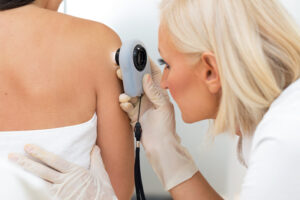At Sussex Premier Health, we’re dedicated to raising awareness and helping you protect your skin. Below, our dermatology experts answer the most common questions about skin cancer, its risks, and how you can stay safe in the sun.

Skin Cancer – Frequently Asked Questions
What are the different types of skin cancer?
The three most common types are:
• Basal Cell Carcinoma (BCC): The most frequent type, usually appearing as a pearly bump or red patch.
• Squamous Cell Carcinoma (SCC): May look like a scaly red sore or wart-like growth.
• Melanoma: The most serious form, often appearing as a new mole or a change in an existing one.
What is the main cause of skin cancer and am I at risk?
The leading cause is ultraviolet (UV) radiation from the sun or tanning beds. You’re at higher risk if you:
• Have fair skin, light hair, or light eyes
• Have a history of sunburns or excessive sun exposure
• Use sunbeds
• Have many moles or a family history of skin cancer
What can I do to prevent skin cancer?
• Use broad-spectrum sunscreen (SPF 30 or higher)
• Avoid tanning beds
• Wear protective clothing, hats, and sunglasses
• Stay in the shade, especially between 11am–3pm
• Get regular skin checks, especially if you’re at high risk
How can I be safe in the sun?
• Seek shade during peak UV hours
• Wear UV-protective clothing
• Apply sunscreen at least 15–30 minutes before going outside
• Reapply every 2 hours, and immediately after swimming or sweating
How should I properly apply sun cream?
1. Use about a shot glass (30ml) for full body coverage.
2. Don’t forget often-missed spots: ears, neck, scalp, tops of feet, and back of hands.
3. Reapply every 2 hours and immediately after swimming or heavy sweating.
What are the symptoms of skin cancer?
Watch for:
• A mole or spot that changes in size, shape, or colour
• Sores that don’t heal
• New growths or lesions that itch, bleed, or crust
• Any asymmetry or irregular borders in moles
How much SPF do I need?
Use SPF 30 or higher, and ensure it offers broad-spectrum protection (against both UVA and UVB rays). For longer periods outdoors, especially during holidays or summer, SPF 50 is ideal.
At Sussex Premier Health, we offer fast access to Consultant-led Dermatology appointments to help you treat and manage a variety of conditions.
Dermatology Team:
Dr Silvia Aguilar-Duran, Consultant Dermatologist
Dr Noor Alwash, Consultant Dermatologist
To find out more please call a member of our Self-Pay team on 01424 757455 or make an on-line enquiry